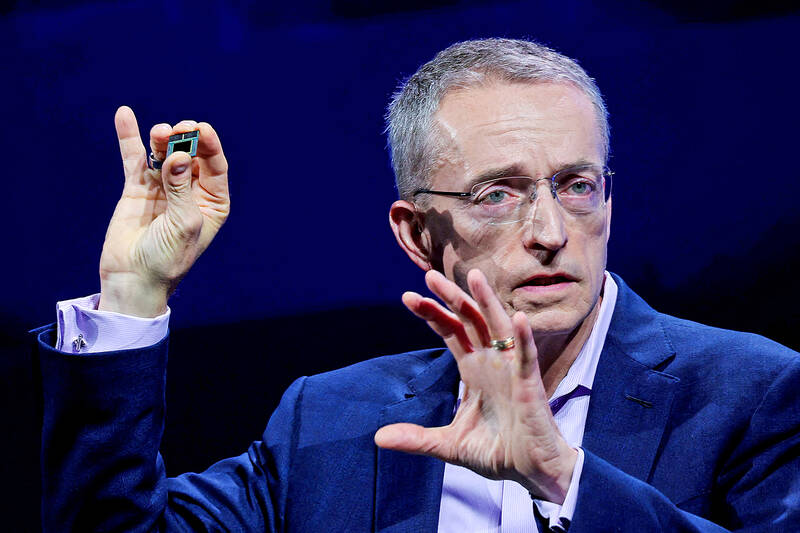Intel Corp chief executive officer Pat Gelsinger has retired from the company and stepped down from its board of directors just as the company is in the middle of trying to execute a turnaround plan.
Intel chief financial officer David Zinsner and Intel Products CEO Michelle Johnston Holthaus are serving as interim co-CEOs while the board searches for Gelsinger’s replacement, the company said in a statement.
Frank Yeary, independent chair of the board of Intel, is to serve as interim executive chair, the company said.

Photo: Ann Wang, Reuters
Gelsinger’s departure is hitting at a tumultuous time for the US chipmaker. Once the industry leader in computer processors, the company is now working to preserve cash to fund a turnaround plan — one Gelsinger called the “most audacious rebuilding plan” in corporate history.
The company has fallen out of investor favor amid a shift in the semiconductor industry toward artificial intelligence (AI) hardware. Companies are spending on computers built around accelerator chips for AI, an area where Intel’s offerings have barely made a dent.
“While we have made significant progress in regaining manufacturing competitiveness and building the capabilities to be a world-class foundry, we know that we have much more work to do at the company and are committed to restoring investor confidence,” Yeary said in a news release. “As a board, we know first and foremost that we must put our product group at the center of all we do. Our customers demand this from us, and we will deliver for them.”
Shares of the chipmaker jumped more than 4 percent in premarket trading, but ended the day down 0.5 percent. They have lost more than half of their value this year.
Gelsinger started at Intel in 1979 and was its first chief technology officer. He returned to the company as chief executive in 2021 to spearhead a transformation of the chipmaker, which was once at the helm of the US semiconductor industry, but ceded its manufacturing lead to players like Taiwan Semiconductor Manufacturing Co (台積電).
Gelsinger said his exit was “bittersweet as this company has been my life for the bulk of my working career,” he said in a statement. “I can look back with pride at all that we have accomplished together. It has been a challenging year for all of us as we have made tough but necessary decisions to position Intel for the current market dynamics.”
Gelsinger's departure comes as Intel’s financial woes have been piling up. The company posted a US$16.6 billion loss and halted its dividend in the most recent quarter. He announced plans in August to slash 15 percent of Intel's huge workforce — or about 15,000 jobs — as part of cost-cutting efforts to save US$10 billion next year.
Nvidia Corp’s ascendance, meanwhile, was cemented earlier this month when it replaced Intel on the Dow Jones Industrial Average.
Additional reporting by Reuters and AP

In Italy’s storied gold-making hubs, jewelers are reworking their designs to trim gold content as they race to blunt the effect of record prices and appeal to shoppers watching their budgets. Gold prices hit a record high on Thursday, surging near US$5,600 an ounce, more than double a year ago as geopolitical concerns and jitters over trade pushed investors toward the safe-haven asset. The rally is putting undue pressure on small artisans as they face mounting demands from customers, including international brands, to produce cheaper items, from signature pieces to wedding rings, according to interviews with four independent jewelers in Italy’s main

Macronix International Co (旺宏), the world’s biggest NOR flash memory supplier, yesterday said it would spend NT$22 billion (US$699.1 million) on capacity expansion this year to increase its production of mid-to-low-density memory chips as the world’s major memorychip suppliers are phasing out the market. The company said its planned capital expenditures are about 11 times higher than the NT$1.8 billion it spent on new facilities and equipment last year. A majority of this year’s outlay would be allocated to step up capacity of multi-level cell (MLC) NAND flash memory chips, which are used in embedded multimedia cards (eMMC), a managed

Japanese Prime Minister Sanae Takaichi has talked up the benefits of a weaker yen in a campaign speech, adopting a tone at odds with her finance ministry, which has refused to rule out any options to counter excessive foreign exchange volatility. Takaichi later softened her stance, saying she did not have a preference for the yen’s direction. “People say the weak yen is bad right now, but for export industries, it’s a major opportunity,” Takaichi said on Saturday at a rally for Liberal Democratic Party candidate Daishiro Yamagiwa in Kanagawa Prefecture ahead of a snap election on Sunday. “Whether it’s selling food or

In the wake of strong global demand for AI applications, Taiwan’s export-oriented economy accelerated with the composite index of economic indicators flashing the first “red” light in December for one year, indicating the economy is in booming mode, the National Development Council (NDC) said yesterday. Moreover, the index of leading indicators, which gauges the potential state of the economy over the next six months, also moved higher in December amid growing optimism over the outlook, the NDC said. In December, the index of economic indicators rose one point from a month earlier to 38, at the lower end of the “red” light.